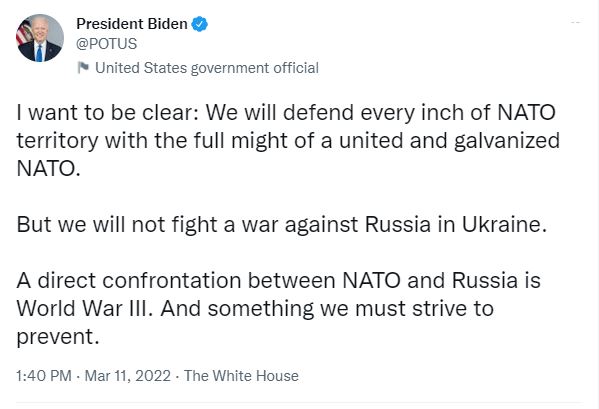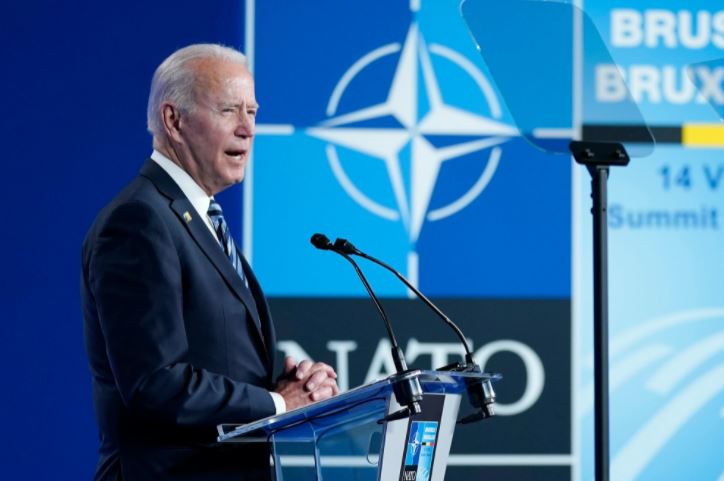For the duration of former President Donald Trump’s term, the news media constantly highlighted his low-brow, stream-of-consciousness tweets. Given that they represented a direct insight into the inner workings of an American president’s thought process, they were dangerous. President Biden’s tweets, not written by the president himself, come from his communications team and are vetted by the “adults in the room” widely perceived to be missing during the Trump administration. These more traditional presidential statements represent a different type of problem: the administration’s actual policies.
Take, for example, Biden’s tweet yesterday, March 11:

Someone wrote, on behalf of @POTUS, “I want to be clear: We will defend every inch of NATO territory with the full might of a united and galvanized NATO. But we will not fight a war against Russia in Ukraine. A direct confrontation between NATO and Russia is World War III. And something we must strive to prevent.”
Since this Biden tweets are official, vetted policy, not stream-of-consciousness ramblings, this tweet might have been worse than anything Trump ever thumbed.
We will defend “every inch” of NATO territory, Biden says, but we won’t fight Russia in Ukraine. Why? Because a direct fight between NATO (one has to assume Biden also means any direct fight between the U.S.) and Russia “is World War III.” This gives rise immediately to important questions. Does Biden really mean that the U.S. will participate in World War III over Poland but not Ukraine? We’ll endure a nuclear winter for Estonia, but not non-NATO Sweden? (Another obvious question is why Ukraine was never admitted to NATO, given that it gave up nuclear weapons only after the U.S. and UK signed off on a guarantee [PDF] that its territorial integrity would be protected.)
Beyond the questions of NATO and non-NATO, why did the president and his administration think it was necessary to say – again – that the U.S. would not fight Russia in Ukraine? Perhaps that is the strategy of the administration, and perhaps there is some logical merit to it. But what is the point of saying so publicly? Why announce to the world, to Putin, that the U.S. has already decided not fight Russia in Ukraine? Why not leave some ambiguity? Why give Putin this assurance that, even if he were to use chemical, biological, radiational, or nuclear (CBRN) weapons on Ukrainian civilians, America would not step in?
Putin has been making not-so-thinly veiled threats by noting that Russia is a nuclear power, and they seem to have had their intended deterrent effect on Biden. Why else would the American president respond by unilaterally taking any tool off the proverbial table? By disarming? America is also a nuclear power, and a superior one to Russia. We have a triad of air, land, and sea nuclear capabilities. Just one American nuclear submarine would be the world’s sixth largest nuclear power if counted separately, and each is virtually undetectable to the Russians. A single American nuclear submarine could potentially wipe out all of Russia’s nuclear capacity, and there is little that Russia could do to stop it. No one wants to think about nuclear war (except Putin), but taking all military options off the table destroys these weapons’ deterrent effect and makes the use of CBRN warfare against Ukraine more, not less, likely. Biden doesn’t have to threaten nuclear war; he could simply keep quiet or, if asked what the U.S. might do if Russia used CBRN weapons, simply respond, “All options are on the table,” the common refrain of American presidents when presented with such questions.
The implications of Biden’s tweet go far beyond Russia and Ukraine. Most obviously, it is highly unlikely that Putin will be content to stop with a victory over Kyiv. If he wins there, he’ll move on to other states. Beyond Putin, how are statements like this understood in Beijing? If a fight between nuclear powers “is World War III” and must be avoided for all states with which the U.S. has no mutual defense agreement, what does that mean for Taiwan? There has been no mutual defense treaty between the U.S. and Taiwan since 1979, when the Sino-American Mutual Defense Treaty was replaced by the much weaker Taiwan Relations Act, which only requires the U.S. to provide Taiwan with weapons. Beijing knows that, aside from a military confrontation, the United States has very few options to deter aggression by China. While the world has mobilized to punish Russia through devastating sanctions, the same would not be true after a Chinese invasion of Taiwan, Vietnam, or elsewhere. Russia has oil, but China and the western world are far too economically intertwined, and the U.S. is currently far too dependent on China’s economy, to entertain any fantasy of punishing Beijing economically.
There are a remarkable number of countries who are U.S. allies with whom we have no mutual defense treaty. We only have actual defense pacts with the NATO states, most of the western hemisphere (though notably not Mexico), the Philippines, Australia, New Zealand, South Korea, and Japan. There is no mutual defense treaty with Israel, our strongest Middle Eastern ally, constantly under threat, including from Russian-backed forces in Syria. Nor is there any defense treaty with Sweden, Finland, the already-mentioned Mexico, Saudi Arabia, South Africa, or a host of other strategically or morally important countries.
Apparently, the U.S. will not fight militarily for any of them, at least not with Russia or China.
A single presidential tweet raises all these questions. But the tweet is not isolated; it is part of a larger problem that pervades the whole Biden administration, which seems to think that an unjust peace is better than a fight for American security, democracy, and the sovereignty of small states. All these beliefs were implied by Biden’s continuation of Trump’s plans to “end the forever war” in Afghanistan, as well as in many other instances, including Biden’s desperate attempt at an Iran nuclear deal – with Russia as the guarantor.
In 2024, we need to find someone who is neither from the “end forever wars” wing of the Democratic Party or the Trumpian populist or “national conservative” wing of the Republican Party. The former rejuvenated the Taliban and handed Afghanistan over to it before its green light by tweet to Moscow and Beijing; the latter actually supports Putin as an “anti-woke” role model.
America – and the world – deserves better.
Image: 2021 stock photo of U.S. President Joe Biden speaking at a NATO meeting. Patrick Semansky/AP
